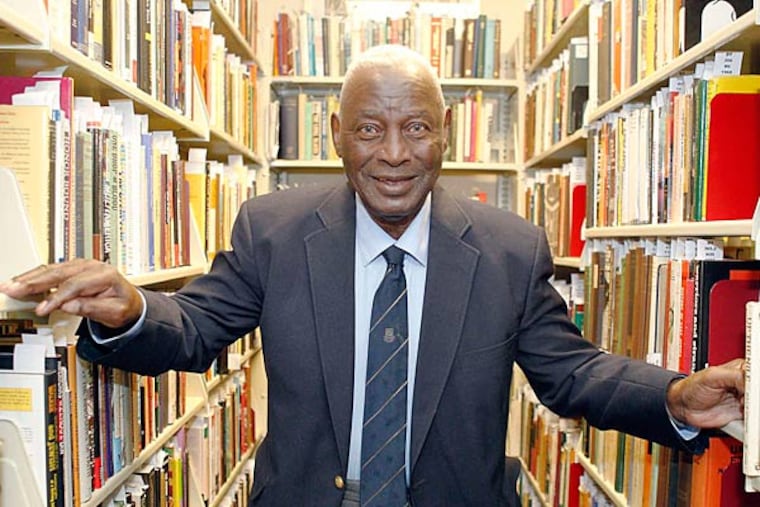A chronicler of black history looks back - and ahead
PHILADELPHIA Charles Blockson has been many things over the years: historian, scholar, athlete, and author. Yet the one title the acclaimed chronicler of African American history has held longer than any other is collector.

PHILADELPHIA Charles Blockson has been many things over the years: historian, scholar, athlete, and author. Yet the one title the acclaimed chronicler of African American history has held longer than any other is collector.
That life's work began in the early 1940s, when he was a fifth grader in Norristown.
"We were studying American history about the framers of the Constitution. . . . I raised my hand and asked the teacher, 'Did Negroes ever contribute to American history?' She said: 'No, Charles. Negroes were born to serve white people.' "
Blockson said that when he went home, his parents told him otherwise. So he began to search for books about African Americans.
"The first book I found was Little Black Sambo," he said. "The term black then was offensive," he said. Later he found a copy of Booker T. Washington's Up from Slavery: An Autobiography.
Those were the seeds of one of the world's largest collections of African American and African books, papers, photos, and artifacts, called the Charles L. Blockson Afro-American Collection at Temple University.
"The oldest book I have is from 1557," said Blockson, who will turn 80 next month. "The next oldest is from 1581."
He also has a collection at his alma mater, Pennsylvania State University, the Charles L. Blockson Collection of African-Americana and the African Diaspora.
In the course of gathering works for his collections over 70 years, Blockson has encountered many of the key figures in African American history, including Langston Hughes, Rosa Parks, and Malcolm X.
"I guess you can say I am blessed, meeting Paul Robeson and Ethel Waters and Marian Anderson," Blockson said. "I met about six legends of the Harlem Renaissance."
As a Penn State fullback, Blockson was on a team that included his friends Lenny Moore and Rosey Grier, future NFL stars. He was recruited in 1956 by the New York Giants, whose assistant coach was Vince Lombardi.
"Vince Lombardi said, 'Blockson, we could really use you.' I chose collecting books."
He's been a real-life Forrest Gump, traveling the world, gathering historical artifacts, and meeting singular people.
Blockson's latest book, The President's House Revisited Behind the Scenes: The Samuel Fraunces Story, is to be published next month. Fraunces was a black man who worked as a spy, cook, and steward for George Washington at the President's House in Philadelphia. Blockson says Fraunces never received the recognition he deserved.
This month, Blockson talked about his life's work to about 100 people who attended a lecture at his Temple collection. Last week he expanded on those stories to an Inquirer reporter.
A tall, imposing man, Blockson said that most of his early collecting was done at a Salvation Army thrift store in Norristown. As he grew, he developed an interest in sports, playing football and competing in track and field. Blockson competed in the Junior Olympics at Franklin Field in 1948.
"I won the shot put. I was so elated, I said: 'I'm going to take a ride down to Ninth and Market Street.' " There he said he found Leary's Book Store, a haven for book lovers.
At Leary's he picked up a used copy of The Underground Railroad, by its famed Philadelphia operative, William Still. In the book he found a reference to one of his ancestors, Jacob Blockson, and others who had escaped slavery in Seaford, Del.
Over his lifetime, Blockson has become an authority on the Underground Railroad, the clandestine network of routes and safe houses used to help slaves escape to freedom in the North.
He said his "greatest surprise" was when he was contacted by National Geographic in the early 1980s to write an article on the topic.
In 1984 the magazine published "Escape from Slavery: The Underground Railroad." Blockson said it was the magazine's first cover story about African Americans.
"The article took me all over the United States, into the Deep South and also the Caribbean. . . . I went all through Canada from Ontario to Nova Scotia." He said he also visited the grave of Harriet Tubman in Auburn, N.Y.
One of his heroes, Blockson said, was Arthur Schomburg, the historian and foremost collector of black books, who died in 1938. Schomburg assembled the acclaimed Schomburg Collection of black research materials in Harlem.
"Some people call me the modern Arthur Schomburg," he said. "I'm following a noble tradition from those who paved the way for me."
Blockson said that while competing in sporting events in New York, he would go to Harlem to visit the Schomburg Center for Research and Black Culture and Lewis Michaux's National Memorial African Bookstore. At Michaux's he met Langston Hughes and Malcolm X.
Michaux introduced him to Malcolm X as a collector of black books. "And Malcolm said, 'Brother, what woke you up?' In other words, what got you into our history? That was five weeks before he was assassinated."
Blockson says he'll never stop collecting. "Although I will be 80 in the next few weeks, I have no regrets. It's a legacy that comes primarily from books and the people I met, all kinds of people of all ages. I am emeritus and all, but I will never retire."
215-854-5717